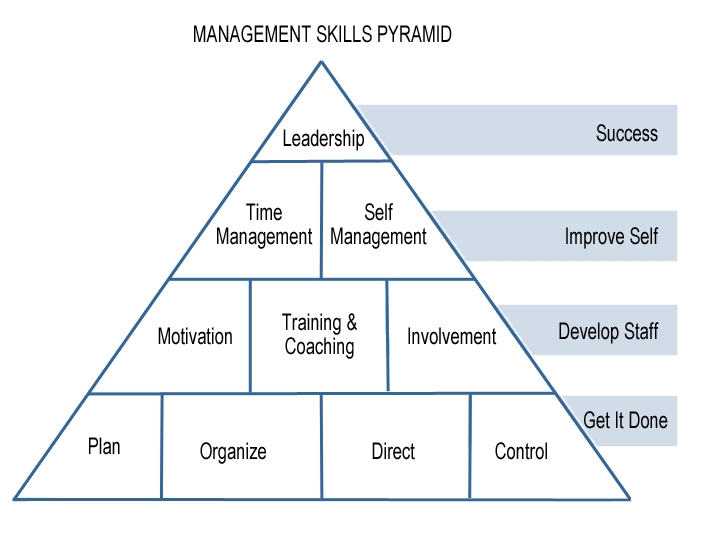A project manager’s expertise is one of the essential prerequisites that determine success of a project delivery. Their responsibilities involve such activities as conducting meetings (e.g. project planning sessions), managing diverse teams, building and maintaining relationships with stakeholders and customers, making decisions, initiating new projects, etc. To be able to put these elements together and achieve a perfect result, project managers should possess certain skills that enable them to manage employees, budget, time and other components of a project efficiently, i.e. management skills. Let’s consider them in detail.
Read more: Key Personal Qualities of an Excellent Project Manager
Management Skills Pyramid: the Way to Success
There are a great number of various theories and approaches determining what qualities and skills a successful manager should possess. One of the approaches is the Management Skills Pyramid developed by Dr. Kammy Haynes. This pyramid represents the hierarchy of skills that any manager should acquire to become an expert. Let’s analyze its levels and how they can be useful for project managers.

The first level: Getting things done
This level consists of basic management skills that enable managers to perform their duties successfully. They are the following.
Planning, as we know, is the first and the most important stage in any activity, which is determinant for its success. It’s a fundamental cognitive skill that is important for any employee to be efficient in their work. Project managers’ work involves a lot of planning: a project’s scope, schedule, budget, timeline, planning for possible contingencies, etc. A lot of planning is performed by project management software these days, which allows PMs to improve the quality of this important stage of the project implementation.
Organizing. The next step is to organize effective work on a project according to the plan. In other words, planning answers the question “What to do?”, while organizing – “How to do that?”. Organizing skills are required for determining roles and responsibilities of project team members, defining goals, allocating resources (human and material). Self-organizing skills are no less important in this process.
Directing involves steering the team members’ efforts on the right course. Does everyone understand the goal and their responsibilities? Are the team members provided with material resources for completing their tasks? Directing the team ensures that its members realize what they are responsible for and navigate towards the common goal.
Control implies monitoring the current work, comparing it with what has been planned, evaluating the results achieved. If something goes wrong, it’s a project manager’s responsibility to take corresponding measures to figure out the problems that have arisen.
This level is the basis for other levels of management skills that develop a project manager’s expertise and make him/her a competent expert.
The second level: Working with the team
These skills are required for building an effective project team and its successful management
Motivation. It’s impossible to achieve the goals set without team member’s engagement. So, to proceed to the next level of management expertise, a project manager must be able to motivate the team. It’s also important to divide responsibilities between the team members in such a way that everyone could be aware of their contribution to the project and do their best. Providing the team members with constructive feedback instead of unreasonable criticism, acknowledging their contribution and supporting them will keep the team motivated.
Training and coaching. A competent manager must be able to identify the team member’s needs for training and professional development to make them more competent and the whole team more efficient. As for project managers, they can also make their contribution to the team members’ professional development. As long as lack of available resources is a common project management challenge, especially in a multi-project environment, project managers can identify gaps in team members’ skill set and recommend them to complete corresponding training. The new skills acquired by employees will make them valuable resources for the company and the team itself cross functional.
Involvement. Training and motivation facilitate team members’ involvement. Positive feedback and precise goals make them more engaged, which in turn motivates them to work on their tasks more efficiently and show their creative sides. One more important thing is avoiding micromanagement: providing the team members with more freedom in making decisions within the scope of their responsibilities, giving them room for errors and supporting their initiatives will make them feel valued.
The third level: Managing oneself
This level covers the skills that are focused on developing a manager’s abilities to control their own work.
Self-management. It’s hardly possible to manage other people effectively without being able to manage oneself. However, it’s not that simple and requires practice and self-discipline. Self-management skills involve the ability to regulate and control one’s actions, feelings, and thoughts; prioritization; goal setting; self-motivation, etc. Having these skills helps a project manager set an example for a project team on the one hand, and on the other hand gives them more control over their own life and career .
Time management is closely related to self-management. Time management is a strategy of planning the available time, and controlling the amount of time spent on performing certain tasks. These skills make it possible to improve performance, reduce stress level, and in such a way become more efficient. Apart from that, time management is defined as one of the major functions of project management, according to PMI: it ensures that a project will not miss the due dates. So, this skill is critical for project managers who are eager to develop themselves as professionals both in personal and professional terms.
The fourth level: Success
The vertex of this pyramid is leadership: i.e. having acquired all of the skills from lower levels, a manager is expected to become a leader. However, the goals of project managers are a bit different. We know that leaders are most often managers, but not every manager must be a leader: being a successful project manager and delivering successful projects regularly is not equal to being a successful leader [1]. At the same time, this doesn’t downplay the importance of proceeding to the top of the pyramid: the hierarchical model of necessary management skills will make it possible to integrate “technical” side of a project implementation (Level 1) with engaged team members and a committed project manager.
Read more: Define Your Personality Type: Tips for Introverted Project Managers
There is one more important component to the successful work of a project manager: utilization of smart software tools. For example Epicflow, the multi-project management software, provides assistance with detailed planning, allocation of resources, monitoring the team members’ performance, managing material resources, and perform a great number of other essential functions. Together with well-developed management skills of a project manager, they make a perfect combination for successful project delivery.
Conclusion
The job of a project manager involves interaction with various people, from ordinary employees belonging to project teams to senior managers. At the same time, they have to make sure that as a result of joint efforts, the project is delivered on time, within budget, and the customers are satisfied. To perform these activities successfully, not only project manager’s knowledge and experience matter, but also their management skills that enable them to manage the project, the team and themselves. The Management Skills Pyramid perfectly illustrates the direction of a project manager’s professional development that in turn is a foundation for their successful career.
References
- Kumar, V. S. (2009). Essential leadership skills for project managers. Paper presented at PMI® Global Congress 2009—North America, Orlando, FL. Newtown Square, PA: Project Management Institute.







